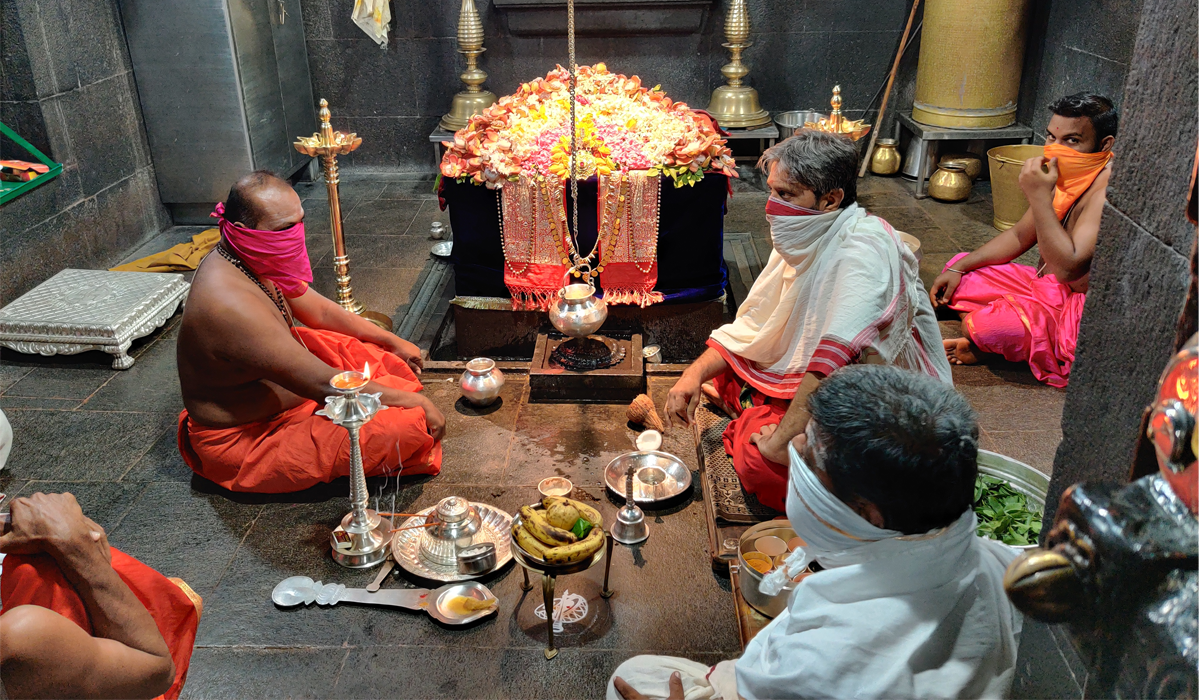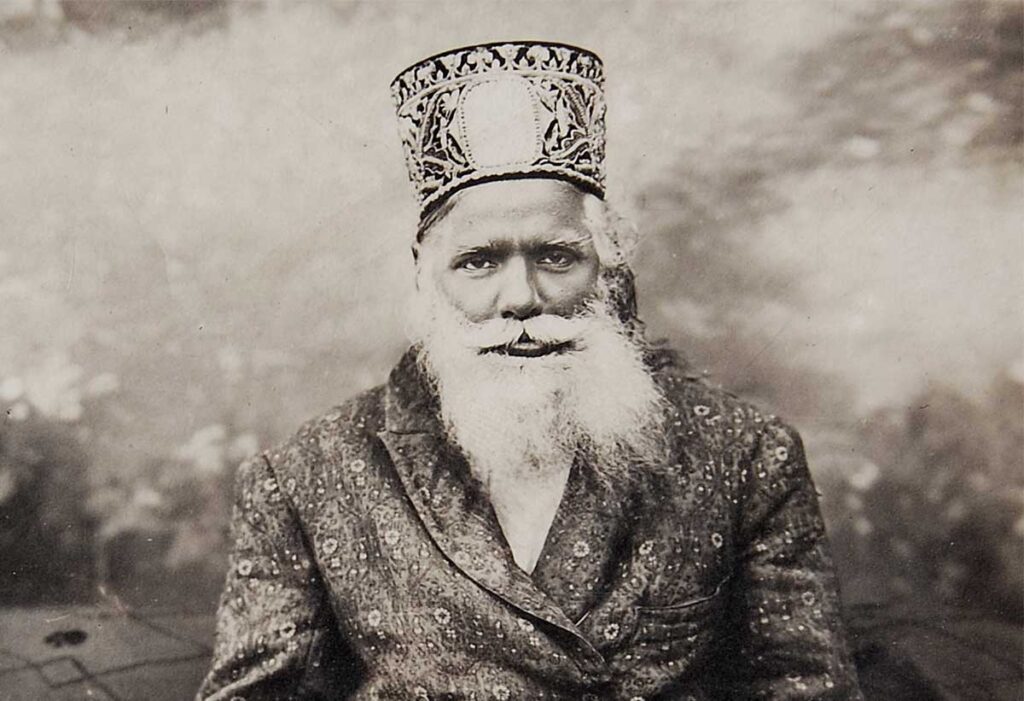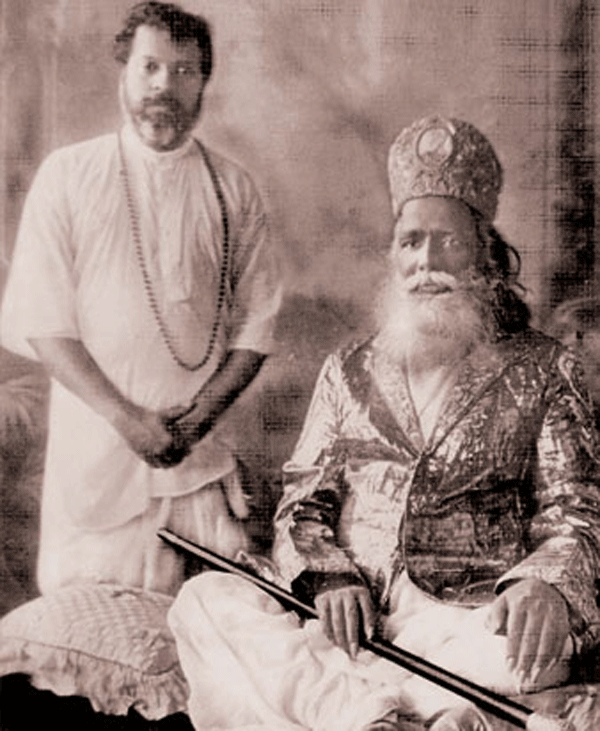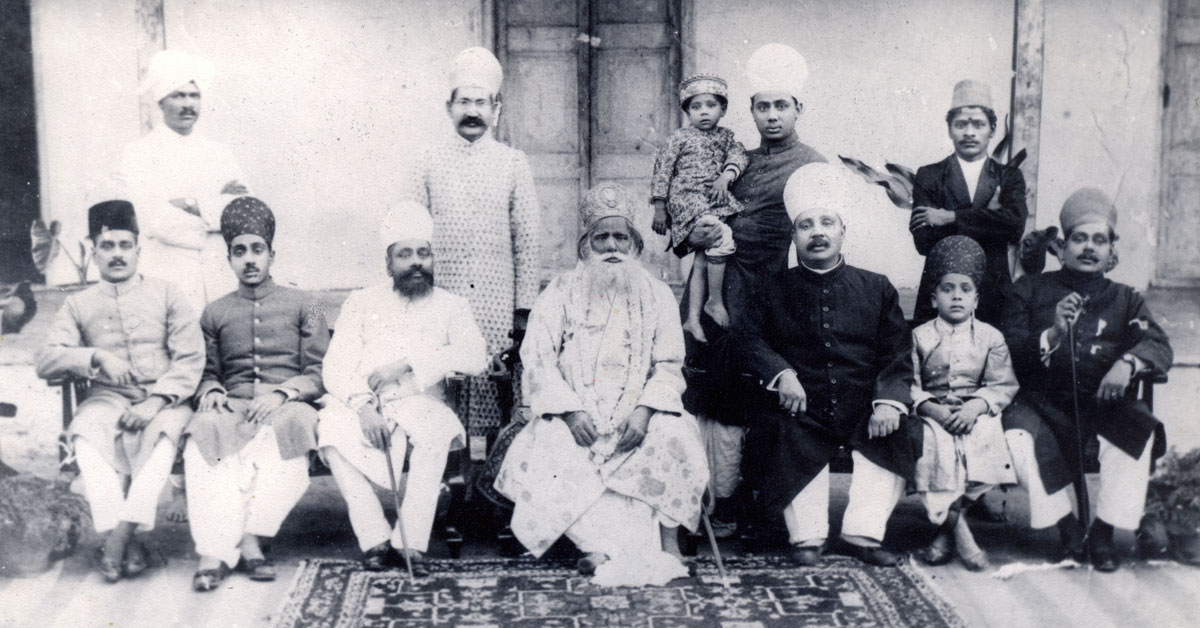by Charudatt Prabhu | Aug 6, 2020 | English

The prevailing pandemic has not thwarted but has hampered the calendar events of Samsthan. The events that have been known for the all the pomp are being held with an austere, that is so unknown.
The Vendanta Saptah Mahotsava concluded days before the national lockdown was announced. The next two events: Ramnavami and Hanuman Jayanti were held behind closed doors with not more than a dozen participating.
And after a few months, the month long Shravan commenced, though the first few days saw the devotees coming to the temple albeit in thin numbers, but soon that too stopped as the Covid-19 cases spiked in the region. The doors of the temple were closed for the public and Nagarkhaana was barricaded.
The morning Mahapooja which is followed by the Sakaldevta Darshan, i.e. a visit to almost all the temples in Maniknagar, was discontinued. Plus, the Satvar Bhajan during the evening Pradosh Pooja, which was attended by many is now performed by a handful of staff.
While, the archaks in Prabhu Mandir and the students of Veda Pathshala are seen wearing a silk-cloth turned mask. When asked how it felt while chanting mantras, one said, “It is not comfortable. But we have to adjust. ” Another added, “It is the first time that we are wearing masks in a sanctum-sanctorum, it feels a bit awkward.”
Surprisingly the Monsoon this year seems to be healthier. The timely showers have made the weather pleasant to the extent that the veterans have recalled their days of yore, by saying, “Maniknagar used to be like this in our childhood.”
Whereas, in these tough times, the devotees from their homes, watch live videos, react to the social media posts and send messages wanting to visit Maniknagar at the earliest.
There is an air of uncertainty, of doubt about how the upcoming events will unfold, we hope soon that will fade, as HE only and only HE will act sooner than later to bring back the lost sheen of events and the smile on everyone’s face.
by Charudatt Prabhu | Aug 2, 2020 | English

Shri Martand Manik Prabhu Maharaj brought about changes in peoples’ lives not always with his lofty philosophical writings, but, sometimes also with a simple corrective scribble.
It was a minor correction which majorly corrected a man’s life.
Just as the Tehsildaar of Rajeshwar started for Maniknagar to have Shreeji’s darshan on a horseback, a snake glided hissing in the front making the horse neigh nervously. The equine swished its tail, stiffed its ears and reared violently, while the rider, losing control, fell on the ground. Considering this a bad omen, the official cancelled his visit.
He turned back home and disappointedly penned a letter to Shreeji, saying: “I, the tehsildaar of Rajeshwar, wanted to see your Holiness. While I was coming for darshan, I fell off the horse as it was confronted by a snake in the way. Hence, I could not make it. Why did this happen to me?”
Shreeji in one of his compositions says, “मी मोठा दंभ हा हटवा”, meaning, “One must not carry arrogance”. And for the letter from Rajeshwar, he had the same message.
Highlighting all the “I” (s) in the officer’s letter, Shreeji wrote a small footnote, “Because you were carrying this with you [I], you could not make it for darshan. Next time around make sure you don’t carry this [I] with you.”
The reply made the self-centered Tehsildaar swallow all his pride.
The reformed and humbled officer lost no time is seeing Shreeji and seeking his forgiveness. This time, ensuring that he did not carry the hefty baggage of ‘I’ with him.
by Charudatt Prabhu | Jul 30, 2020 | English

Pandit Vishnu Digambar Paluskar with Shreeji | Bombay 1919
The metallic brakes of the steam engine squealed and the chimney huffed smoke into the Bombay sky as the Madras Mail, the only train connecting the city to the southern part of the country announced its arrival at the Victoria Terminus station with a loud shrieky whistle. It was 1919, Shri Martand Manik Prabhu Maharaj’s first visit to the port city.
Bombay (now Mumbai) was not only the foremost trading centre of British Presidency, but was also a thriving hub of art, music and culture.
When Pandit Vishnu Digambar Paluskar – the doyen of Hindustani Classical Music learnt that Shreeji was in town on an official visit, he invited Shreeji to the Sandhurst Road branch of the Gandharva Maha Vidyalaya that he had recently launched. A great patron of music that he was, Shreeji not only obliged, but, on his insistence, also agreed to stay at the Vidyalaya for a few days, during which stalwarts like Ustad Rehmat Khan Saheb, Ustad Abdul Kareem Khan, Pandit Bhaskarbuwa Bakhale and Vidhushi Kesarbai Kerkar performed in hazri before him and sought his blessings.
Musicians lined up for Shreeji’s darshan, waiting for an opportunity to perform in front of him. Among the regular visitors was Narayan Shripad Rajhans, popularly known by the stage name ‘Balgandharva’, whose music was greatly liked and appreciated by Shreeji. It is said when Balgandharva performed, everyone, including Shreeji, would lose sense of time and the sabha most of the time would continue until the wee hours.
On the concluding day of Shreeji’s stay at the Maha-Vidyalaya, Pandit Vishnu Digambar Paluskar offered Sangeet Seva and his performance impressed Shreeji so much that he placed a garland of flowers around Panditji’s neck.
Overwhelmed by Shreeji’s appreciation, Pandit Paluskar, in his thanksgiving speech said that he considered the garland of flowers received from Shreeji as valuable as a navaratna haar (a garland of gems). Interrupting him midway, Shreeji called him and placed his own navaratna haar around Panditji’s neck.
“Why consider a garland of flowers as a navaratna haar? Instead, wear one.”
This great gesture from Shreeji moved Pandit Paluskar to tears. He was speechless and did not know how to thank Shreeji.
Very few know that the navaratna haar which Shreeji presented to Pandit Paluskar had actually been gifted to him by Jagadguru Shri Narsimha Bharati Swamiji ji – Shankaracharya of the Shringeri Sharada Peetham, as prasaad, when he visited Maniknagar during Shri Sadguru Manik Prabhu Maharaj’s era. When both the brothers – Manohar Prabhu and Martand Prabhu, who were very young then, were respectfully presented by Shri Prabhu himself before the Acharya for his blessings, the Acharya most thoughtfully gifted a rudrakhsa maalaa to Shri Manohar Prabhu and a navartana haar (a necklace of gems) to the younger brother – Martand Prabhu. This probably was Jagadguru’s way of appreciating the inherent yogic vairagya (dispassion) of the young Manohar Manik Prabhu and the sparkle of spiritual majesty that he saw in his three-year-old brother, Martand Manik Prabhu.
It is not without reason that Maniknagar is truly called the “The Mecca of Music”, where musicians receive rare honour. Music is the second name for the Divine at Maniknagar.
by Charudatt Prabhu | Jul 29, 2020 | English

Sir Kishen Pershad Bahadur standing second from left.
Shri Martand Manik Prabhu Maharaj would often seclude himself for days, deeply engaged in his saadhana and anushthaan. Shreeji would often sit in pooja for hours and most of the time it would go on until the late hours of night or even extend upto the early hours of morning. Once after a prolonged pooja, Shreeji went to bed unaware about who was to visit later that day.
As morning turned into noon a motorcade ingressed through nagarkhana. The Prime Minister of Hyderabad, Maharaja Sir Kishen Pershad Bahadur alighted from his car and went straight into Prabhu Mandir for darshan. After the darshan, the Prime Minister inquired with the Muntazim of the Samsthan Hanumantrao whether he could have Shreeji’s darshan. The Muntazim was now on the horns of dilemma. For neither he wanted to say ‘not possible’ nor did he want to disturb the deep slumber of Shreeji, as he knew that Shreeji had retired for rest only sometime back. He smartly muffled, “Sir, Shreeji is resting. If you so desire, I shall go and wake him up.” The Prime Minister had no option but to reply, “No! No, do not disturb Shreeji. Once he gets up, please inform me. I shall be happy to wait.”
Late in the afternoon, the Muntazim went to the Prime Minister, at the Inspection Bungalow in Humnabad to invite him. Upon meeting Shreeji, Sir Kishen Pershad mesmerized by Shreeji’s divine charisma, spontaneously recited an Urdu couplet, which read: “hazaron faiz paye hain, ki lakhon sar jhukaye hain, hai koi karam mein aisa toh martand manik mera.”
After this, the Prime Minister remained an ardent devotee of Shreeji and visited Maniknagar frequently.





Recent Comments